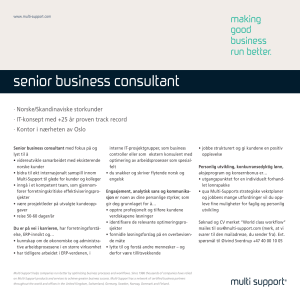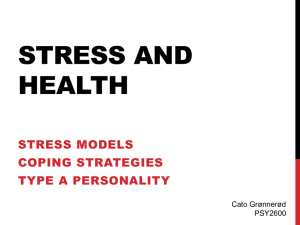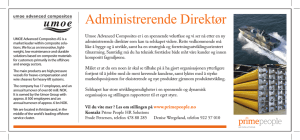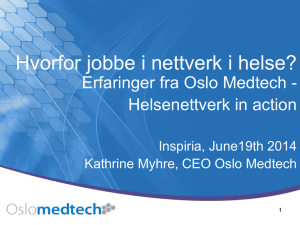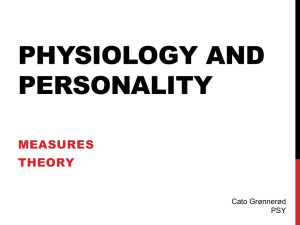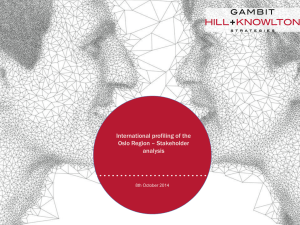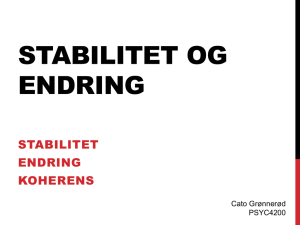How do we recruit and retain international expertise
advertisement
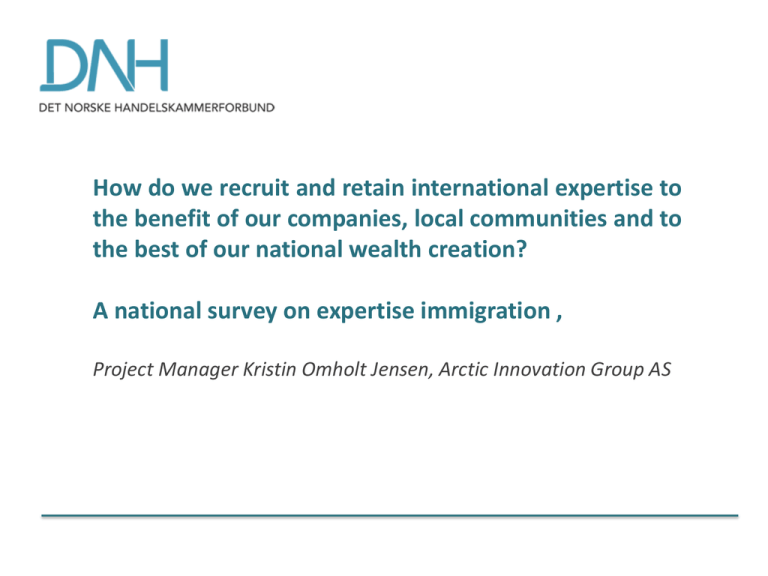
How do we recruit and retain international expertise to the benefit of our companies, local communities and to the best of our national wealth creation? A national survey on expertise immigration , Project Manager Kristin Omholt Jensen, Arctic Innovation Group AS Expertise Immigration – How do we make Norway to a preferred country? Identification of obstacles and some proposals to create “a change” Whom did we address this report to? The media Central and local authorities Enterprises, research institutions and universities Local Chambers of Commerce / Næringsforeninger What make this report different from other reports? A co-operation with many different stakeholders. Industry neutral Includes a benchmark survey A things to do list is addressed to the stakeholders The Goal of the study To make it easier for companies to recruit and retain employees with foreign backgrounds and education in a global world where place matters. To influence different interest groups to find new solutions that makes it even easier for highly competent employees, to come to Norway to live and work. Our working process and “research method” We have read many reports ...... and there are many reports We have interviewed the management within many companies in Norway We have interviewed highly educated people with a "non Norwegian" background / nationality living in Norway We have interviewed people in the bureaucracy (departments, directorates and other authorities) We have discussed with an Advisory Board, We have bench-marked our country with our neighbouring countries” (Sweden, Finland, Denmark and ……… Canada ) Members of our Advisory Board Advisory Board Paul Chaffey, Abelia Knut Aarbakke, Akademikerne Silvija Seres, TechnoRocks Thor Simonsen, Manpower Mathilde Fasting, Civita Kathleen Mathisen, DOF Subsea Torben Vad, Damvad Ingeborg Lund, SINTEF Tove Selnes, Opera Software Ole Berrefjord, Berrejord & Thomassen Frode Vik Jensen, Deloitte Harald Seip Stubbe, Statoil Harald Martinsen, Sydvaranger Gruve Terje Meyer, Kirkenes Næringshage Paul Kristian Thoresen, Agility Group Trude Helgesen, DNV Tom Pettersen, Tilflyttingsprosjektet i KS June Murison, International School of Bergen Ingvild Myhre, selvstendig næringsdrivende, flere styreverv bl.a styreleder i Forskningsrådet Styringsgruppe: Lars-Kåre Legernes, Oslo Handelskammer Tarje, Bjørgum, Abelia Solveig Holm, Bergen Næringsråd Hans M. Borchgrevink , Forskningsrådet Inger Tone Ødegård, Næringsforeningen i Stavanger-regionen Prosjektleder: Kristin Omholt-Jensen, Arctic Innovation Group AS The world - is it flat or….? …or do place matter (attractives)? “Oil & gas , Marine and Maritime – the backbone of the industrial development in Norway: These industries are located along our coastline The three industries are historically linked together Expectations of economic growth within these industries The interest from the industries to focus on innovation and technology is great There are many highly innovative companies who need to attract the best global talents if these industries are to succeed A growing need for highly trained / skilled personnel Else Ragni Ytterdal v/Møreforsk Do we need global expertise immigration to Norway? Demografi - Kan vi få flere i arbeid? Arbeidslinja Inngående balanse: ca 5(1,4 mill mill innbyggere Arbeidsstyrken: 2,7 mill menn / 1,3 mill kvinner) Utdannelse Antall pr kvinne Arbeidsløshet: 3,2% i 2012 1,85 (Europa 1,5) Kanbarnefødsler vi utdanne flere? Tall frabefolkningen tekniskmer beregningsutvalg, TBU viser%at norsk DenKan norske blir stadig Andel menn/kvinner i jobb: 75,6 %eldre / 68,3 vi utdanne riktige ift etterspørsel? dag de ligger: Ca 700 lønnsnivå 000 som isier vil jobbe men • 28 prosent over de svenske, som står utenfor arbeidsmarkedet • • • 40 prosent over de danske 54 prosent over de tyske og 69 prosent over snittet av våre handelspartnere. H øy løn nsve k st h a r git t h øye k ost n a de r Kilder: Statsbudsjettet 2013: OECD, Finansdepartementet og Teknisk beregningsutvalg Pressekonferanse Konjunkturrapporten 2013 06.02.2013 24 Norway – The best country in the world to live and work in! Everyone wants to come to Norway of course!!! The Economist har utarbeidet ”The Global Talent Index report – The Outlook to 2015” Norway – The best country in the world to live and work in, or…..? Fra ”The Global Urban Competitiveness Report 2011” (Pengfei Ni) If you look hard – you will find Norway …..there! Do you think Norway is the most preferred country to live and work in? Do you think it is a good idea that one region in Norway compete with another region in Norway? Do you think our regions can compete with other regions in other countries? Expertise immigration – who are they? Expertise immigration – who are they? What do the companies say? 60-70% of our balance sheet consists of ”talents / bright heads “ – Access to global talents is an important issue for us! International expertise provides the knowledge and insight that makes innovation and adaptability easier and we get impulses from outside Norway If we are unable to attract and retain the right skills for positions in Norway. In the short term: Re-organizing internally (also not hiring) Using employees in our offices in other locations / in other countries, Interact via digital projects and project management tools that allow people to live where they want In the longer term it will prevent investment, adaptability and economic growth in Norway and this will take place where we can recruit global talented people. "Our business lies where the human resources are” Henning Ramfjord (National Oilwell Varco) What do the companies say ? What is important in attracting international competence ? Interesting and challenging tasks A company with a strong trade mark, global recognition and presence. Attractive location with strong knowledge based industry. What do the companies say ? Integration? Easier to integrate young singles than families Most important «stay in Norway factor» -well being at work and for the family . Most important «leave Norway factors» depend on the immigration group. • Global Globetrotters. • Project workers hired for a certain period. • Employees considering settling down in Norway. What do the people say? • Most people in Norway work, important that the partner also finds a relevant job. • Important that companies (or someone) offer social activities outside the workplace and include the family. • Access to international schools is important for the global talent group, when considering a Norwegian city . • They all want the urban lifestyle • A possibility to change job ? Global mobility There are three groups of skilled immigrants with very different needs …. Global Globetrotters; – – – – – Travelling around. Mostly single. Focus on career and challenging work. Choose countries with low entry barriers. 2-4 year perspective. Hired project workers; – Many in this group from India. – Do not bring family. – Focus on getting the job done. Employees considering settling down in Norway Stay if employee and family like it - Partner also gets a job. A summary ATTRACTING factor Interessant jobb i et internasjonalt kjent firma Regionen er kjent for å være god i noe (for eksempel olje & gass, maritim sektor og marine) Folk forstår engelsk Tilgang på internasjonal skole Fredsnasjon og Menneskerettigheter Godt velferdssystem Trygt, rent og pent Prøve noe annet – “The Nordic” er litt eksotisk PREVENTING factors Norge er ikke “første ønske” på en karriere stige? Dyrt å bo og leve Høye skatter RETAINING factors Jobben er veldig spennende Familien trives; partner har jobb, fått barn og de trives på skolen Lite hieraki - direkte tilgang til “sjefen” Alle behandler individ med respekt(et likeverdig menneskesyn - uansett posisjon og penger) Liten levestandard forskjell mellom “fattig og rik Selvstendighet i arbeidet (ingen forteller deg i detalj hva du skal gjøre) Trygt for for barn å vokse opp Vi kan kombinere jobb og familie LEAVING Factors Partner trivdes ikke Ingen forfremmelses mulighet Ingen mulighet for å bytte jobb til annet firma Dyrt å bo og leve, dårlig utvalg av mat og dyrt! Savner “puls”, bylivet, familie og venner – alle nordmenn drar hjem eller på hytta i helgene. Å spise på restaurant er veldig kostbart, så da sitter vi hjemme En kø for alle – ingen fordel å være VIP/flink Utdannelse slår ikke ut ift høyere lønn! What kind of policy do we have in Norway? Expertise Immigration = asylum and immigration The labour market policy First employment of Norwegian workers Then EU citizens Then 3rd party countries The immigration policy Focus on asylum and refugees – policy wise the global labour skill will sort under this policy (we adjust and make a regulation(forskrift)) The integration policy Responsibility lies with the regions - most focus on the well-being of asylum and refugees - little focus on "well-being of those with expertise" The Political responsibility today…… Our central government's responsibilities are: Work and residence permits (UDI) Approval of skills / education (NOKUT) Integration Our local authorities' responsibilities are : Integration Language training Provision of school and kindergarten and the auditing Auditing of the companies policy related to HSE (health – Safety Environment) and the Working Environment Act) The responsibilities of the companies To following the Work Environment Act (and the collective agreements) for all employees – no special responsibility for foreign expertise A holistic immigration expertise policy?? Who has the overall responsibility today? There are five ministries: Arbeidsdepartementet, Kunnskapsdepartementet, Finansdepartementet, Justisdepartementet Barne, likestillings og integreringsdepartementet. And there are very many authorities who influence the policy: NAV Eures NAV Arbeidstilsynet Arbeids og velferdsdirektoratet Integrering og mangfolds direktoratet IMDi Samarbeidsprosjekt NY I NORGE Samarbeidsprosjekt ”work in Norway” NOKUT Utdanningsdirektoratet Senter for internasjonalisering av utdanning (SIU) Lokale Service senter (Oslo, Stavanger og Kirkenes) Politidirektoratet Lokale politistasjoner UDI Skatte etaten Lokale kommuner Expertise Immigration – what do they do in other countries? Sweden Labour immigration (arbeidsinnvandring) Denmark A comprehensive expertise working migration policy (En helhetlig kompetansearbeidsinnvandrings politikk) Finland Asylum and immigration, adapts "barely" to EU Restrictions (Asyl og innvandring, tilpasser seg ”så vidt” EU) Canada A country built on immigration expertise but clearly express the countries expectations What do they do in the regions today? The “challenge” has been put on the radar- but no one seems to have a co-coordinated holistic strategy (recruit & retain)! Building industrial clusters have received increasing attention lately - "let the region become known for being the best” in a global competition (the competition is global within the industry not between Norwegian regions). There are many associations and organizations around but very little cooperation between the associations in the region. Very few regions have established regular meeting places where they discuss a long term policy on how to attract and retain global talents. Few regions have established regular meeting places where organizations, local authorities, representatives of public authorities and businesses meet regularly. Some Chambers of Commence have established INN - International Network of Norway and there are many Expat / Relocation companies. What makes a region successful? What do the successful regions do to compete in a global world where place matters? The region has built a strong international Brand (recruit and retain) Should I stay or should I go……… To attract and retain is two sides of the same coin Attracting Working & Living Welcoming Place Family /friends Work Choice of place to live! Leaving A holistic national expertice immigration policy must be prepered and the policy must be based on: Company demand driven (and changing demand) Demographic trends and the aging European population Shift in economic growth centers in the world (from west to East and South) We have signed an EU agreement We are a part of a global world where place matters Many companies today are multinational and their business cross boarders (grenseoverskridende) Many companies are increasingly dependent on highly skilled expertise The working conditions and type of contracts are changing (more project related work) That both parties in a relationship have their own career A holistic national expertise immigration policy – lets start to work! Politikerne Utarbeid en helhetlig kompetanseinnvandrings politikk basert på næringslivets behov! Sentrale myndigheter Rask og forutsigbar saksbehandling Bedre statistikk så vi ikke blander begrep Informasjon før personen kommer til Norge og informer gjerne om rettigheter men også om plikter Lokale myndigheter Place matter! Region er viktigere enn land! La regionen bli kjent for å være flink/ god til noe (innen en næring). Vær et godt vertskap – ”Velkommen til oss senter! Legg til rette for bedriftsetableringer slik at det blir mange bedrifter (enklere å bytte / finne ny jobb) næringsklynger Næringsforeninger Arranger regelmessige møteplasser sammen med andre i regionen Akademia Vær mer synlig i lokalmiljøet og jobb tettere med næringslivet og lokale foreninger. Bedriftene Bygg bærekraftige bedrifter med internasjonale ambisjoner. Vær pådriver og delta i arbeidet med å utvikle og innovere regionen. Bygg trivsel i bedriften og i regionen THANK YOU – for your attention! Kristin Omholt-Jensen, kristin@arcticinnovationgroup.com
